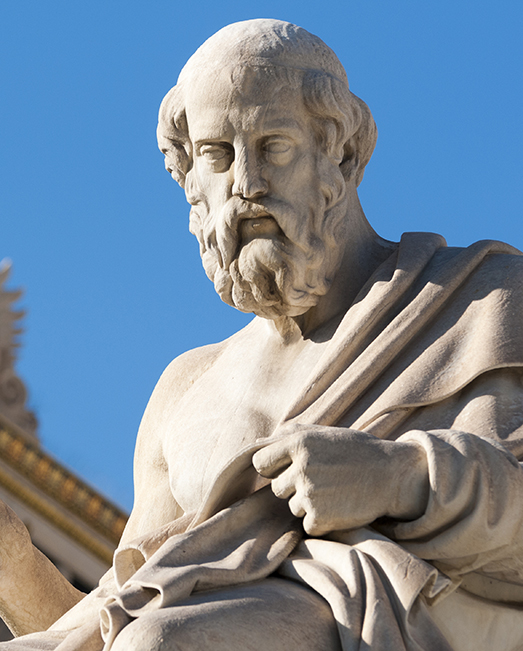Career
Copyright@ Australian Catholic University 1998-2026 | ABN 15 050 192 660 CRICOS registered provider: 00004G | PRV12008
Copyright@ Australian Catholic University 1998-2026 | ABN 15 050 192 660 CRICOS registered provider: 00004G | PRV12008

On a clear autumn evening in central Melbourne, a New Zealand-born philosopher named Stephen Finlay is taking a picture of the sunset while waiting for a tram on his way home from work. He has just moved to Australia from California to take up his role as director of ACU’s new Dianoia Institute of Philosophy. As well as being a distinguished global figure in the field of metaethics, Professor Finlay is, it should be said, an approachable guy. A woman sidles up and asks him what he’s doing.
“I tell her I’m taking a picture of the sunset, and then she asks me what I do for work and I say, ‘Oh… philosophy’, sort of wincing at what her response will be.”
Talking to strangers about your profession can be awkward for many of us; for philosophers, it’s often a source of dread.
“Then she smiles and says, ‘Oh yeah, I read a lot of philosophy. I’ve got Kant’s Critique of Pure Reason waiting on my bedside table’. We then proceed to have a brief but lively conversation about the finer points of Kant and philosophy, before parting ways.”
It’s a pleasant encounter, and a reassurance that for all the mystery and misconception that surrounds philosophy, there is some understanding of it amongst the general population. But what happens at a dinner party, when someone asks the dreaded question?
“Well, you tell them you’re a philosopher, and you never know what their response will be, but the reaction I anticipate is a scoff and the comment, ‘Oh, so you’ve got your head in the clouds’,” says Finlay, who has taught at the University of Southern California since 2002, and still holds a professorial role there.
“But in actual practice, the most common reaction is great interest, because most people I encounter have philosophical thoughts and philosophical questions, and they’ve spent time thinking about these things and are curious, but they’ve generally never had the opportunity to talk to a professional philosopher.”
These positive experiences aside, there is no doubt that philosophy presents a soft target for its disparagers, who are often quick to point out that it’s not tied to any obvious monetary gain.
So why does philosophy matter? And how is it useful?
“The answer to that will not be short,” Professor Finlay warns, before identifying a prior question that needs to be answered: What is philosophy?
“I think that’s an important question to address first because there are a lot of misunderstandings and preconceptions about what philosophy is,” he says.
“The answer is controversial amongst philosophers, but I think philosophy is really just a method or an activity, a set of tools for thinking, rather than a topic.”
It’s at this point that Stephen Finlay invokes the concept of dianoia, the name of ACU’s new research institute, decided on after a long and exhaustive process of selection.
The word was coined by the Greek philosopher Plato, one of the world’s most influential thinkers, to describe the processes of thinking that lead us to insight and truth. For Plato, dianoia are the tools that enable us to go from ignorant opinion (doxa) to true knowledge and understanding (nous).
“While dianoia is often disparaged as inferior to nous or knowledge itself, we decided it was a great title for the institute because we thought, ‘Well, that’s exactly what philosophers do’”, Professor Finlay says.
“Some people think philosophy is just opinion, and philosophers just sit around on campus thinking, arguing and writing about opinions, but I believe I speak for my colleagues when I say that none of us thinks that way about philosophy.”
That’s not to say philosophers don’t have opinions; clearly, they do. But philosophy itself is more than a person’s view on a particular topic or dilemma: it’s a search for objective truth.
“We often hear that we’re living in a post-fact or a post-truth world, where you can have your facts, and I can have mine,” he adds.

“This is profoundly un-philosophical. It’s anti-philosophical. And so I think philosophy is clearly lined up on one side of the battleground there.”
In pursuing objective truth, philosophers engage in “slow, careful thinking”, of the type that is becoming increasingly uncommon in an age where information is disseminated at breakneck speed, and where opinions seem to hold more sway than facts and reason.
“Twitter is, I think, the complete opposite of philosophy,” Finlay says, referring to the medium’s propensity for ultra-fast, ill-considered hot-takes.
Perhaps, in this time of great haste, philosophy is exactly what we need … to slow us down.
Growing up in suburban Auckland, on New Zealand’s North Island, the young Steve Finlay was a studious kid, but he got to his last year of high school and felt burnt out. “I was a bit of a nerd, but I still wondered what I had been busting my gut for.”
Nonetheless, he enrolled in philosophy and history at the University of Auckland and “immediately got hooked”.
“My perception of it was, here are people who are asking questions that I had always asked as a kid, but whenever I mentioned these questions to anyone, people sort of laughed at me and said, ‘These aren’t serious questions’,” he says.
“And yet, here they were actually being studied as serious questions at a university, and I found that really exciting.”
After finishing his master’s degree, Finlay had a brief sojourn in “the real world”, where for two years he worked in tech support for a pharmacy software company.
“Tech support is a bit like philosophy because it’s problem-solving,” he says.
“You have a problem and you have to try to track down the source of the problem, run through all the possibilities and eliminate them until you’re left with one, and then, you know, that’s the problem identified.
“I just found it frustrating because I didn’t feel the problems I was working on were important.”
He decided academia was his pathway to solving problems that mattered, and headed overseas to pursue a postgraduate study at the University of Illinois, which then led him to California, where – armed with a PhD and a passion for teaching and research – he landed a job at the University of Southern California (USC), the state’s oldest private research university.
Fast-forward some three decades, with post-truth politics sweeping the world and society, those serious questions he asked as a teenager are arguably more relevant than ever.
“I think we’ve never seen so many philosophical questions being debated in so many public forums, possibly ever, but certainly in my lifetime,” he says.
“Questions like, ‘What are facts? What is truth? How can we know what is real?’ These are exactly the types of questions you expect to get exposed to if you take a philosophy class at university, and nowadays, there are op-eds in newspapers almost every week, and yet philosophers have been struggling with these questions for centuries.”
At USC, Professor Finlay earned a name for himself as a distinguished figure in his field, and the School of Philosophy earned a rating as one of the top 10 philosophy programs in the world. In 2014, his book Confusion of Tongues was described as “one of the richest, most sophisticated, and most impressive books on metaethics”.
Finally, after almost 20 years in California, he got a phone call from ACU.
“They were asking whether I'd be interested in directing a new institute, and I was intrigued because pure research institutes in philosophy are pretty much unheard of, so within a couple of days I’d made up my mind that this was a chance I couldn't miss,” Professor Finlay says.
“It’s an incredible opportunity for the individual researchers we have recruited, and collectively we have a unique opportunity to shape the future of philosophy, but more broadly, given the societal importance of philosophy, to have a very wide-ranging, long-term impact on the future of society as well.”
Which brings us back our earlier question: Why does philosophy matter?
“First ask yourself why you want to ask that question,” says Finlay. After all, this act is itself a philosophical exercise.
“You can’t address the question, ‘Why does philosophy matter?’ without thinking philosophically, without doing philosophy.”
This is, by the way, one of the many quandaries that philosophers consider: What is valuable and worthwhile, and why? Therefore, asking a philosopher ‘Why does philosophy matter?’ naturally results in a mind-bendingly circular discussion.
One reason it’s worthwhile is that it uses logical thinking and argument to find answers for complex and abstract questions. Questions about the nature of reality: Do we have free will? What is consciousness? Is there a God? Can we prove it? What is it to have knowledge?
But beyond answering these questions, does philosophy contribute anything to society?
Finlay’s response is that philosophy can have a massive societal influence, but that it’s often hard to anticipate or recognise because of its indirectness, large scale and unpredictability. He cites the example of Alan Turing, one of the great minds of the 20th Century, whose story has become widely known from its depiction in the Hollywood film The Imitation Game.
It was philosophical, mathematical and reflective thought that enabled Turing to break the German military code, helping the Allies to win World War II and end the fighting.
“It’s arguable that Turing’s contribution to winning the war was greater than that of any other single individual person,” Finlay says, even though (as is depicted in the film) its value was doubted by the officials supervising and funding the effort.
Need more proof of philosophy’s contributions? Take a look at today’s headlines. Many stories will likely wrestle with philosophical quandaries.
“There are issues about democracy and how it should be structured, about the rights of immigrants, about animals and the consumption of meat, and medical ethics, and taxation, and the ethics of autonomous vehicles,” Professor Finlay says.
“All this shows that philosophy is monumentally important. It’s arguably had more impact on the direction of human history than any other kind of human intellectual activity, and it will continue to do so, now and in the future.”
ACU’s Dianoia Institute of Philosophy aspires to achieve a world-leading position for philosophical research in the analytical tradition, with a focus on metaphysics, epistemology, metaethics and logic, social and political philosophy, and other central areas of philosophical inquiry.
Copyright@ Australian Catholic University 1998-2026 | ABN 15 050 192 660 CRICOS registered provider: 00004G | PRV12008